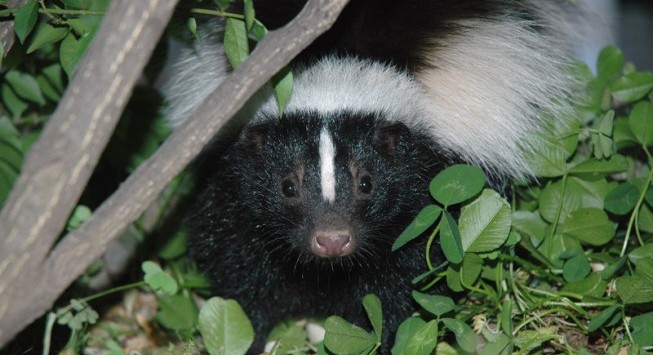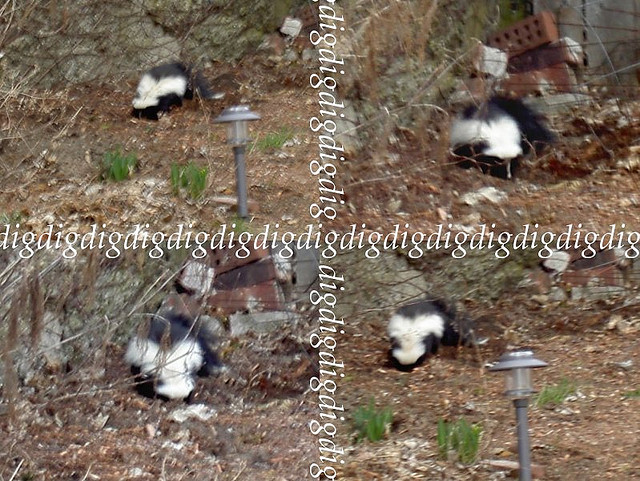How To Keep Skunks Out Of Your Garden

Out of all the pests that can invade your garden, skunks are one of the least welcome. While they tend to be non-aggressive and even look cute, they can make quite a stink if you get too close. To make matters worse skunks have a tendency to dig a lot of holes in flower beds and lawns, looking for grubs. This can turn your yard into an unsightly mess, as well as completely destroy a lot of hard work you put into landscaping or starting a vegetable garden.
Thankfully, there are some approaches you can take to keep skunks out of your garden in a humane way.
Make Your Yard Unappealing To Them
Skunks are attracted to specific things in your yard and garden. If you can remove these things then you can also reduce how often skunks turn up. If you’re lucky, you can stop them coming by at all.
As with many other pests, skunks are attracted to food that is left outside (like pet food) and to garbage that is easy to access. Additionally, they are attracted to areas that make for easy dens, such as access to crawl spaces, piles of wood or rocks, elevated sheds and any openings under porches.
It may take some time to catch all the loose ends around, but make a list of possibilities, and start checking things off one by one. Start by removing pet food from outside, then lock the trash cans, etc.
Additionally, skunks tend to look for grubs when lawns are wet. You can decrease how often this happens by making sure that you don’t overwater your lawn. Likewise, you want to try and harvest any ripe vegetables and fruit as soon as possible so skunks can’t turn to them as a food source.
You should also look at removing any fruits or vegetables that have spoiled as these can also attract skunks. Just because you don’t want to eat it doesn’t mean an animal won’t think it’s a tasty treat.
If you are having serious problems with skunks, an alternative approach is to treat the garden for insects. Skunks will often come into your garden specifically to look for bugs, as these are a food source for skunks. If you can reduce the number of insects for skunks to eat you should also be able to decrease the amount of skunks that visit as well.

photos source: flickr
There are natural methods to getting rid of insects, as well as using plain old insecticide. Which method you use is up to you. If growing vegetables, I tend to use more natural repellants on the leaves and outsides of the plants, but am not that worries about what I put in the ground. Maybe that makes sense, maybe it doesn’t, but it’s how I roll.
Using Deterrents Consistently
As nocturnal animals, skunks naturally shy away from sources of light. You can take advantage of this by lighting your yard at night, which tends to make the area much less of a ‘safe zone’ to skunks. Using solar lighting for this purpose can help decrease the cost.
You can also use lights that take advantage of a motion sensor. In that case, the light will only turn on when the motion of the skunk is detected, which normally means that they have to get inside your property first. The downside is that if no one is around to follow through with scaring them off, they might learn that the light isn’t really a threat. They aren’t vampires!
Scent-based deterrents can also be an effective tool against skunks. Some examples of scents that repel skunks include pepper sprays, ammonia, moth balls and citrus peels. You can also use dog or fox urine (some stores sell products containing these), as these animals are both natural predators for skunks.
While scent-based deterrents can work well, you do need to reapply them regularly, especially after it has rained heavily. You can generally expect to have to reapply them every few days, at least while skunks are active. Results are hit and miss with scent stuff, and when I was dealing with my cat problem, repellants didn’t work one bit.
Some plants also act as deterrents to skunks, especially plants that are difficult to walk over. One example is squash because of the hairs on the leaves of the plant. Another example is Crown Imperial, which has an bad smell to skunks (image that!). Unfortunately, many humans also don’t like the smell, so it might not be the best choice.
Regarding fences, since these animals are prone to digging, setting up some simple chicken wire around your plants may not be enough to get the job done. For a more permanent solution, you may need to dig a trench and bury part of the fence below ground, and do daily maintenance to refill new holes as they appear.
Motion Sensor Sprinklers
One humane way to get a skunk out of your garden is with a motion sensor sprinkler. Water is completely harmless, and the surprise of getting sprayed does not give them any kind of permanent psychological damage. This method mimics a predator defending its territory, and other animals, including skunks, will quickly learn to forage for grubs somewhere else!
All you need is a hose with the water turned on, and connected to the sprinkler. Using battery power, the units infrared sensor can detect motion and activate during the day and night. You can even set the degree and distance of the spray.
I purchase 3 and chained them together which covered my entire front yard and completely got rid of the neighbors cats pooping in my flower beds and lawn. My current recommendation is the Orbit model because it’s fairly priced and made of high quality material. Other models tend to be way more expensive, or cheap by just about $10 with lots of negative reviews on Amazon.
Use Traps, But Only As A Last Resort
It is also possible to use traps to take care of a skunk problem. If you do this, you want to catch the skunks as humanely as possible and release them in locations away from your home. The best traps to choose are ones that have a tubular shape and that are narrow. This shape helps to calm the skunk and also means they can’t raise their tails, and thus can’t spray.
Traps can be baited with items like peanut butter, berries or cat food and then placed within the garden or along paths that skunks like to travel. However, you should always check the local laws about trapping and releasing skunks (and animals in general), because they do vary considerably.
Additionally, trapping skunks should only ever be a last resort. Generally speaking, skunks are fairly docile and their visitation to your garden will naturally die off on its own. Trapping can be a traumatizing event for the skunk and it often simply shifts the problem, making your life easier and someone else’s more difficult.
Give It Time
Unlike some pest species, skunks are not persistent in gardens or lawns. Often they may end up digging holes on only a few occasions as they are moving locations. In some cases a particular skunk may take a liking to your garden, but even then, this behavior is seasonal.
The activity of skunks tends to be the highest in spring and naturally decreases as time goes on. So, if you are having trouble with other methods of control, you do have the option of waiting for skunk activity to decline on its own. Because of the odor the skunks give off when you mess with them, sometimes the simplest approach is to let them be until they move on.
Categorised in: Animals
